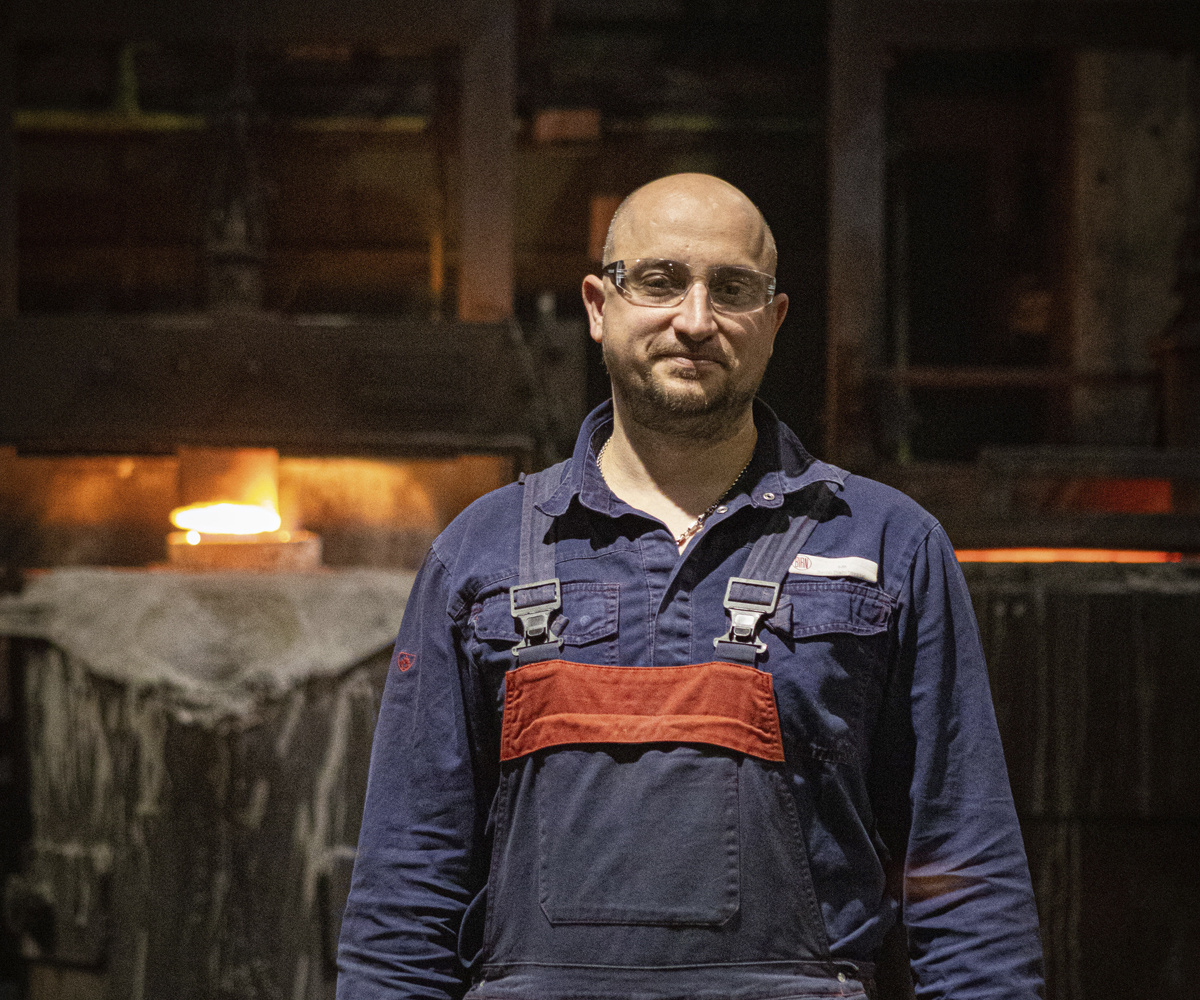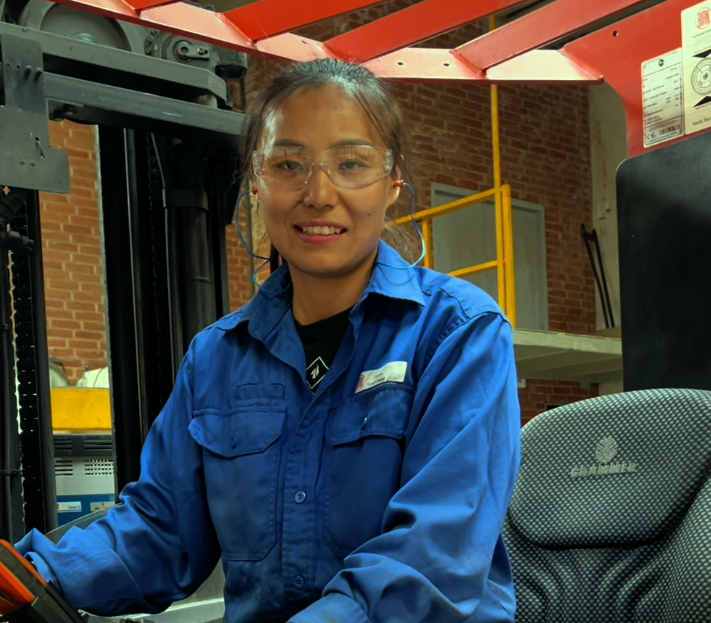Foundry technician
A foundry technician's everyday life typically takes place in a high-tech production environment at iron and metal foundries, where you will cast many different products such as ship propellers, aluminum chassis for motorcycles or gearboxes for trucks – using CAD programs and CNC programming, among other things.
Foundry Technician
Are you looking for an apprenticeship as a Foundry Technician?
Contact us to hear more about the possibilities for an apprenticeship as a Foundry Technician at BIRN.
Become a Foundry TechnicianBIRN takes responsibility for training the foundry technicians of the future
BIRN is one of Northern Europe's largest foundries, and with roots dating back to 1896, the company has a long-standing and very solid foundry tradition. BIRN has therefore also been one of the driving forces in re-establishing foundry technician training in Denmark, and in 2021 the company succeeded in doing so in close collaboration with UC Holstebro, among others. BIRN has around eight foundry technician apprentices at a time, says Kurt Bjarne Larsen, foundry technical manager and responsible for foundry technician apprentices at BIRN:
- We need skilled labor in the foundry, and we are looking at a fairly large generational shift with a high average age in the foundry technician profession over the coming years. We therefore have a great responsibility to attract new and younger employees who can build on top of the more experienced forces. We are very proud to have helped build up the training program in Denmark and to offer a very structured training plan for the apprentices we have at BIRN. They first get a tour of all departments in the foundry to get a good overall impression and a good all-round knowledge of the profession. Subsequently, they go more in-depth with specific parts of the foundry work, he explains.
Popular morning meetings for apprentices
At BIRN, a lot of effort is put into giving the apprentices a good understanding of the many different processes in casting, so it becomes clear to them why each step is important. At the same time, the apprentices must also feel that they are an active and important part of the company's daily life. That's why Kurt Bjarne Larsen has introduced bi-weekly morning meetings for apprentices only, where he gives them a slightly deeper professional insight into technical issues or general knowledge sharing on foundry technology topics. An initiative that the apprentices are very enthusiastic about, explains Kurt Bjarne Larsen:
- I've seen several times that even apprentices who had the day off actually show up for the morning meeting anyway. My impression is that the meeting is a really good forum to get a more thorough explanation of how we have solved a particular technical challenge and how to approach it in the future, he explains.
What our foundry technician apprentices say
Privileged as an apprentice
As an apprentice you are an active part of the company, and I really like that. We get involved in many different things and projects, and I think we are privileged as apprentices. The training and apprenticeship are under control and we go on a lot of cool trips to other foundries and suppliers, which gives us a broad knowledge of the entire industry. BIRN is also a very safe place to be, and even though I'm one of only two female apprentices as a foundry technician, I feel like one of the boys and am very pleasantly surprised at how well we have been received in a classically male profession. If you're not afraid of getting a little dirty, you shouldn't be afraid to train as a foundry technician as a woman.
Kathrine Laursen, foundry technician apprentice
Pure magic to melt iron
When I started as a temporary worker at BIRN, I was already looking for opportunities to learn more and educate myself. I think it's pure magic to melt iron into other items, so I was quickly captured by the subject and therefore immediately seized the opportunity to take the foundry technician training when it presented itself.
As a apprentice at BIRN you get a broad insight into all departments. It provides a good overall understanding of all the processes in a foundry. We also had a joint meeting with all the other apprentices and students at BIRN, including industrial technicians, surface treaters, electricians, and warehouse workers. It was really exciting to meet the other apprentices and hear what they do in other parts of the company.
Serhii Pishchevskyi, foundry technician apprentice
Combining craftsmanship, precision and technology
I have chosen to apply as a foundry technician apprentice because it is an exciting combination of craftsmanship, precision and technology. It fascinates me that you can shape so many different items out of liquid iron – and that the iron consists of recycled steel scrap, which is given new life in the process. It makes sense to me.
I come from China, but have lived in Denmark for 10 years and have previously worked in agriculture. Now I look forward to gaining new professional knowledge and experience in an industry where tradition and innovation go hand in hand.
Youxhi Zhang, foundry technician apprentice
From apprentice to permanent employee
The vast majority of BIRN's foundry technician apprentices are adult apprentices and thus over 25 years old. This is attractive both for BIRN as a company and for the individual apprentices, partly because the apprentices come with a lot of experience before they train, and because as an apprentice you become a permanent part of the day shift. In addition, BIRN aims to retain apprentices as skilled employees once they have completed the foundry technician training, if possible.
- Of course, training apprentices is resource-intensive, but it's resources well spent if we can create our own food chain of future employees who are both qualified and motivated. Many of our apprentices have often started as unskilled workers in our production. This has typically given them an interest in the profession and a desire to learn more, and when they can see that they won't see a pay cut by taking an education, it's not a long way from unskilled to student and apprentice, says Kurt Bjarne Larsen.
Innovative Apprenticeship of the Year
BIRN regularly facilitates visits to other foundries or suppliers both at home and abroad so that apprentices can see for themselves where the raw materials come from. They can also attend training courses at machine manufacturers to learn how to produce with the machines used at BIRN. BIRN also participates in the foundry industry's apprentice exchange program, where foundries throughout Denmark exchange apprentices with each other for a week every year.
- The foundry industry in Denmark is generally aware of our own responsibility to train apprentices and thus the workforce of the future. For example, the various foundries contribute teaching staff to the training program, where specialist teachers are made available at the schools. BIRN is located just 500 meters from the school in Holstebro, so it's very easy for us to contribute with everything from equipment and teachers to guided tours for students. In 2022, we were also named Innovative Apprenticeship of the Year by UC Holstebro and came second nationally. Apprentices nominate and vote for the award, so it's a great recognition of us as an apprenticeship and an award we are very proud of, says Kurt Bjarne Larsen.
INNOVATIVE APPRENTICESHIP OF THE YEAR 2022
"We appreciate it when companies support and make room for their apprentices to experiment and make use of their skills in a busy everyday life."
Head of Education at UCH, Jan Lillelund.


